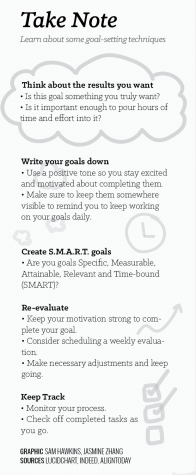Ready, Set, Goal
Students involved in rigorous academics, extracurriculars discuss benefits of goal setting
Submitted Photo: Baenan McKeown
Junior Baenan McKeown kicks a soccer ball during a game. McKeown is a member of the varsity soccer team this year, on top of participating in Ambassadors and taking multiple IB diploma classes and AP courses, and said setting goals helps him manage it all.
 Recently, manifesting and journaling have become popular and some have argued goal setting can help people succeed in school and extracurriculars. However, CHS students have utilized goal setting in different ways.
Recently, manifesting and journaling have become popular and some have argued goal setting can help people succeed in school and extracurriculars. However, CHS students have utilized goal setting in different ways.
Meet junior Grace Rexroth: she plays CHS tennis, is a member of Senate and is involved in many rigorous academic courses. How does she keep up? She said her secret to success is goal setting.
“It has definitely helped me become the best person I can be and (I) just have different goals I’m trying to reach slowly, that way I can eventually improve in school, sports and all that,” she said.
Next, meet junior Baenan McKeown: a member of Ambassadors, the varsity soccer team and a club soccer team. In addition, he is pursuing an IB diploma and taking multiple AP courses. He said he agreed with Rexroth and also said goal setting is essential for students with time-consuming extracurriculars to maintain academic success.
“(Goal setting) makes it so that I can kind of, not only compartmentalize, but be more efficient at completing my work. When I’m more efficient at completing my work, I have extra time to do it which means it’s likely going to be higher quality,” McKeown said.

AVID teacher Kyle Cluver said students who want to try goal setting should begin with something of importance to them, even if it’s an extracurricular goal, such as a sport or hobby.
“Don’t necessarily go straight to the academic goals. Yes, those are easier to formulate, but I would say to do something of interest to you because then you’re going to hold yourself a little more accountable,” he said. “And then if you have those baby benchmarks on the way, that’ll help too.”
Additionally, Rexroth said she mostly keeps track of goals mentally, occasionally using a whiteboard.
“I definitely am a mental person, just because if I write it down I lose the paper… I keep a lot of it in my head, honestly, and I also have a whiteboard at my house that I just write down any thoughts that I have of things I have to do,” she said.
Cluver said he is also a proponent of writing goals down. He said he has started weekly journaling in order to set and modify goals for himself.
“I have my kids do (goal setting) all the time in writing. Simply because mentally, I think there isn’t as much accountability as writing,” Cluver said. “And even more, beyond just the writing, I would get someone else involved.”
McKeown said he disagrees because he prefers to set goals mentally so he does not feel overwhelmed and can avoid burnout. He said setting short-term mental goals works for him because he is driven by internal motivation.
“When I set that type of goal, then I’m like, ‘Okay it’s cool, I only have like three weeks left of this grind and then I can relax,’” he said. “And so by doing that I can kind of numb the pain.”
Rexroth said she is motivated internally, but also externally, to achieve her goals.
“My goal this year was to make the tennis team, the top JV, and I was able to do that,” she said.
However, Cluver said one should not always measure goals tangibly.
“Goals are everywhere in life and it doesn’t always have to be a certain grade, a certain championship, a medal, a this, that and the other thing, the tangible things,” Cluver said. “Do the intangibles, do a way of life. You want to drink water everyday, you want to have an apple every other day, a healthy lifestyle—more than just the accolades that come with school and sports.”


